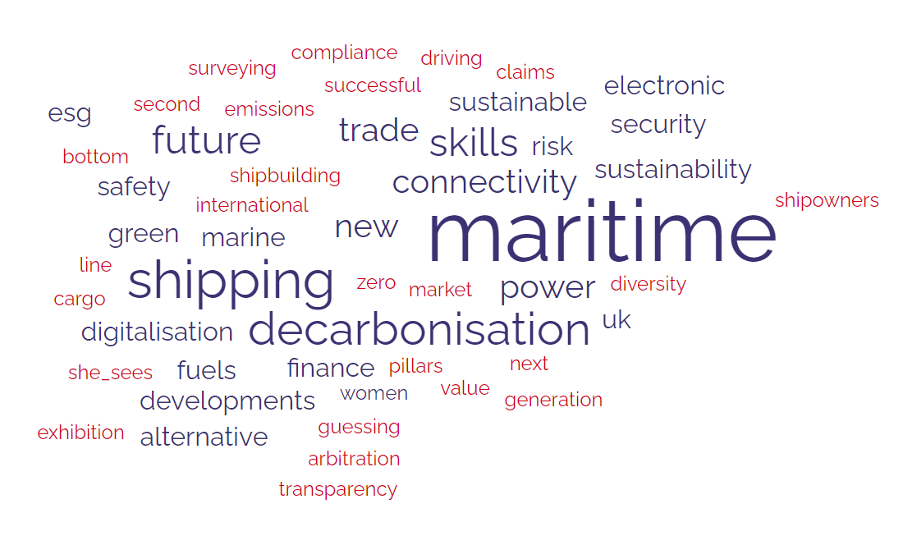
London International Shipping Week (LISW) reaffirmed the UK's position as a global maritime leader, gathering influential voices from the industry worldwide for a week of insightful dialogues, debates, and exhibitions. Taking place across various venues in London, LISW's extensive programme delved into a diverse array of topics shaping the future of global shipping and trade.
The above word cloud is a collection of the themes covered in the calendar of events. Within this broad spectrum, several prominent themes emerged:
- 1. Sustainability at the Forefront: Sustainability took centre stage, with strong commitments to decarbonisation. Flagship events like the Global Maritime Forum Annual Summit created momentum around achieving net-zero emissions through technological and nature-based solutions.
- Diversity and Inclusion: Spotlight events on diversity and inclusion, such as Women in Maritime and WISTA’s People, Planet, Prosperity, underscored the importance of empowering women and achieving ESG's social goals.
- Cutting-Edge Technologies: Cutting-edge technologies captured attendees' attention, with the Maritime Startup Forum highlighting how digitalisation is reshaping the shipping industry. Topics like machine learning, artificial intelligence, autonomous vessels, and data analytics held significant promise.
- Economic and Geopolitical Realities: Leaders grappled with sober economic and geopolitical outlooks. Events like the Market Outlook analysed volatile trade patterns, while discussions on dispute resolution were held.
- Skills Development and Talent: Forward-looking discussions centred on skills development, preparing future talent, and safeguarding welfare through various events.
Throughout a bustling week of activities, LISW underscored the dynamism, resilience, and global impact of the shipping industry. The following bullet points provide an analysis of the key developments, discussions, and takeaways from this influential event.
KEY THEMES:
- Sustainability and Decarbonisation: Many events focused on sustainability, reducing carbon emissions, and adopting eco-friendly practices, reflecting the industry's commitment to environmental responsibility.
- Diversity and Inclusion: The maritime industry is increasingly addressing diversity and inclusion, with events such as "Women in Maritime" and discussions about skills and social aspects of ESG (Environmental, Social, Governance).
- Seafarer Welfare: The Mission to Seafarers delivered a review of their work from the Executive Roundtable on Crew Welfare in Singapore. They explored the progress needed to deliver true positive change for seafarers.
- Technology and Digitalisation: Several events explored the role of technology, digitalisation, and automation in improving efficiency, safety, and decision-making in the maritime sector.
- Regulation and Compliance: Topics related to compliance, transparency, and regulatory challenges are common themes, highlighting the importance of adhering to international standards.
- Risk Management: Discussions on cargo claims, shipping risk, and supply chain risks emphasised the industry's focus on managing risks effectively.
- Trade and Economics: Many events revolved around international trade, trade finance, and the macroeconomy, highlighting the industry's economic significance.
- Skills and Training: Several events were concerned with skill development, training, and future skills needed for a changing industry landscape.
- Safety and Security: Events addressing maritime safety, security, and protection of offshore infrastructure emphasise the industry's commitment to safe operations.
- Innovation and Research: The importance of innovation, research, and development in shaping the future of maritime was a recurring theme.
- Global Perspective: Discussions on geopolitics, big power politics, and international objectives for decarbonisation reflect the global nature of the shipping industry.
- Ethical and Social Responsibility: Events touched upon social aspects, seafarer welfare, ESG in logistics, and protecting ocean environments, highlighting the industry's ethical responsibilities.
- Trade and Connectivity: Connectivity, electronic trade documents, and global supply chain management are recurring themes, reflecting the importance of seamless logistics.
These themes underscore the multifaceted nature of the maritime industry and its commitment to addressing a wide range of challenges and opportunities, from sustainability and technology to safety and global trade.


Submit a comment